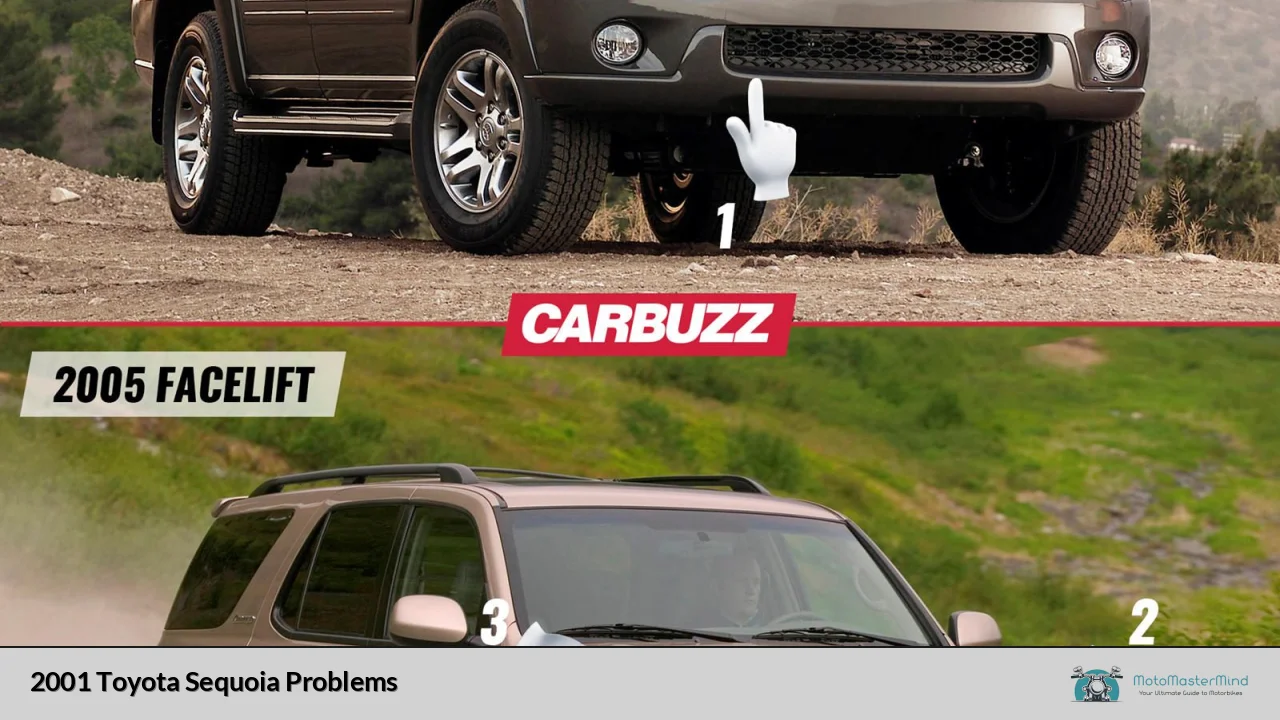Are you ready to dive into the world of cars and explore the potential problems that can arise with a 2001 Toyota Sequoia? Buckle up and get ready for an informative ride!
When it comes to the 2001 Toyota Sequoia, like any other vehicle, there are a few common issues that owners have encountered. One of the most reported problems is related to the vehicle’s transmission. Some drivers have experienced rough shifting or slipping gears, which can be a cause for concern. It’s essential to address any transmission issues promptly to avoid further damage and costly repairs.

Another problem that has been noted with the 2001 Toyota Sequoia is related to the vehicle’s suspension system. Some owners have reported issues with worn-out struts or shocks, leading to a bumpy and uncomfortable ride. A faulty suspension can also affect the overall handling and stability of the vehicle, so it’s crucial to have it inspected and repaired if necessary.
Electrical problems have also been reported in the 2001 Toyota Sequoia. Some owners have experienced issues with malfunctioning power windows, door locks, or even the vehicle’s stereo system. These electrical glitches can be frustrating and inconvenient, but they can often be resolved by checking the fuses or seeking assistance from a professional mechanic.

Furthermore, some owners have complained about excessive oil consumption in their 2001 Toyota Sequoias. This issue may result in the need for frequent oil top-ups and can potentially lead to engine damage if not addressed promptly. Keeping a close eye on your vehicle’s oil levels and having regular maintenance check-ups can help prevent any long-term damage.
Lastly, while not as common, some drivers have reported experiencing brake-related problems with their 2001 Toyota Sequoias. These issues could include brake squeaking, reduced braking performance, or even brake pedal vibrations. It’s crucial to ensure that your brakes are in optimal condition for your safety and the safety of others on the road.
The 2001 Toyota Sequoia, like any other vehicle, has its fair share of potential problems. From transmission and suspension issues to electrical glitches, oil consumption, and brake-related concerns, staying proactive with maintenance and addressing any problems promptly can help ensure a smooth and enjoyable driving experience. Remember, regular inspections and seeking assistance from qualified professionals are key to keeping your Sequoia running smoothly for years to come!
Unraveling the Mystery: Common 2001 Toyota Sequoia Problems and Solutions
When it comes to the 2001 Toyota Sequoia, a few issues have become the talk of the town. If you’re a proud owner or considering purchasing this robust SUV, it’s crucial to be aware of these common problems and their solutions. Let’s dive right in!
One problem that many owners have encountered is an issue with the vehicle’s transmission. Some reported experiencing slipping gears, erratic shifting, or even complete transmission failure. This can be a frustrating ordeal, but fear not! One solution is to have the transmission fluid checked and replaced regularly. Additionally, ensuring that the transmission is properly maintained by a qualified mechanic can go a long way in preventing such problems.
Another mystery that has perplexed some Sequoia owners is the occurrence of excessive oil consumption. It seems as though the engine has an insatiable thirst for oil, leaving drivers puzzled and concerned. To address this, regular oil level checks are essential. If you notice a significant drop in oil levels between oil changes, it’s recommended to consult a mechanic. They can perform a thorough inspection to identify any potential leaks or faulty components that might be causing the excessive oil consumption.
One more enigma that has surfaced involves the vehicle’s electrical system. Some owners have faced challenges with malfunctioning power windows, door locks, or even non-functional dashboard lights. The key to unraveling this mystery lies in checking the fuses and relays related to the affected components. Sometimes, a simple fuse replacement can solve the issue. However, if the problem persists, seeking professional assistance is advised to diagnose and fix any underlying electrical faults.
The 2001 Toyota Sequoia, while generally reliable, does have its fair share of mysteries when it comes to common problems. Remember to maintain your transmission properly, keep an eye on oil consumption, and check the electrical system regularly. By doing so, you can untangle these mysteries and ensure a smoother driving experience. Happy travels!
Safety Concerns: A Closer Look at Recurring Issues with the 2001 Toyota Sequoia

Introduction: When it comes to ensuring our family’s safety on the road, choosing a reliable vehicle is paramount. However, over the years, certain car models have faced recurring safety issues that merit deeper scrutiny. In this article, we will focus on the 2001 Toyota Sequoia and shed light on some of the safety concerns associated with this particular model.
Airbag Deployment Failures: One concerning issue reported by numerous Sequoia owners is related to airbag deployment failures. In certain instances, the airbags failed to deploy during accidents, potentially compromising the occupants’ safety. This recurring problem raises questions about the effectiveness and reliability of the vehicle’s airbag system, prompting owners to seek solutions to prevent such failures.
Sudden Unintended Acceleration: Another significant safety concern revolves around incidents of sudden unintended acceleration (SUA) in the 2001 Toyota Sequoia. Some drivers have reported instances where their vehicles experienced rapid acceleration without any input from the accelerator pedal. These occurrences are not only alarming but also pose a serious risk to both the driver and other road users. The reasons behind these incidents remain a topic of debate among experts.
Rollover Risk and Stability Control: The 2001 Toyota Sequoia has also been associated with an increased risk of rollovers, particularly during sharp turns or evasive maneuvers. This can be attributed to the vehicle’s high center of gravity and limited stability control features. Such limitations may compromise the handling and stability of the Sequoia, making it more susceptible to rollover accidents, especially when driving at higher speeds or on uneven terrain.
Addressing the Safety Concerns: Toyota acknowledges the potential safety concerns associated with the 2001 Sequoia and encourages affected owners to bring their vehicles to authorized dealerships for inspection and necessary repairs. Additionally, the company has implemented safety recalls and software updates to address some of the reported issues. Maintaining regular communication with Toyota and staying informed about recalls and technical bulletins can help owners ensure their vehicles are up-to-date on safety measures.
Conclusion: Safety is of utmost importance when it comes to any vehicle, and the 2001 Toyota Sequoia has faced its fair share of recurring safety concerns. From airbag deployment failures to reports of sudden unintended acceleration and rollover risks, it is crucial for owners to be aware of these issues and take appropriate measures to address them. By staying informed and working closely with authorized dealerships, owners can prioritize their safety and maintain peace of mind while driving their Toyota Sequoia.
Navigating Reliability Challenges: Key Problems Owners Face with the 2001 Toyota Sequoia
Are you a proud owner of a 2001 Toyota Sequoia? While this SUV has undoubtedly served many owners faithfully, it’s not without its fair share of reliability challenges. In this article, we’ll delve into the key problems that owners often encounter with the 2001 Toyota Sequoia and provide insights to help you navigate these hurdles.
One common issue that plagues the 2001 Toyota Sequoia is engine misfire. This occurs when the fuel mixture in the engine’s cylinders fails to ignite properly, resulting in a rough running engine and reduced performance. If you experience this problem, it’s crucial to have it diagnosed promptly by a qualified mechanic who can identify the root cause, which could range from faulty spark plugs to a malfunctioning ignition coil.
Another concern that owners may face is with the vehicle’s suspension system. Over time, components such as the shocks and struts can wear out, leading to a bumpy and uncomfortable ride. Regular inspections and maintenance can help identify any potential issues early on and prevent further damage to the suspension system.
Furthermore, some owners have reported transmission problems in their 2001 Toyota Sequoias. These issues can manifest as delayed shifting, slipping gears, or complete transmission failure. It’s essential to address any signs of trouble promptly, as neglecting transmission problems can result in costly repairs or even the need for a full transmission replacement.
Electrical glitches are also known to plague the 2001 Toyota Sequoia. Owners have reported problems with the power windows, door locks, and even the dashboard lights. These issues can be frustrating and inconvenient, but they can often be resolved by checking and replacing fuses or addressing faulty wiring connections.
Lastly, rust and corrosion can affect certain areas of the vehicle, particularly the undercarriage and wheel wells. Regularly washing your Sequoia, especially during the winter months or in areas with road salt, can help mitigate the risk of rust damage. Additionally, applying a protective coating or wax can provide an extra layer of defense against corrosion.
Being aware of these reliability challenges and taking proactive measures can help you maintain the performance and longevity of your 2001 Toyota Sequoia. Remember to consult with a qualified mechanic for any specific issues you encounter, as they will be best equipped to diagnose and address these problems. Keep your Sequoia running smoothly, and enjoy the road ahead!
Behind the Wheel Woes: Understanding the Troublesome Aspects of the 2001 Toyota Sequoia
Are you considering buying a used car? If so, it’s important to gather all the relevant information about the vehicle before making a decision. In this article, we will delve into the problematic aspects of the 2001 Toyota Sequoia, shedding light on its potential woes behind the wheel. So, let’s buckle up and explore what you need to know!
One of the recurring concerns with the 2001 Toyota Sequoia is its transmission system. Many owners have reported issues such as rough shifting, slipping gears, and even complete transmission failure. These problems can lead to expensive repairs and inconvenience for the drivers. It’s essential to thoroughly inspect the transmission and test drive the vehicle to ensure its smooth operation.
Another troublesome aspect that owners have encountered is related to the engine. Some Sequoia models from this year have exhibited a tendency for excessive oil consumption. This can lead to engine overheating, loss of power, and potential engine damage if not promptly addressed. Regular maintenance, including oil level monitoring and timely oil changes, is crucial to prevent these issues.
Furthermore, the 2001 Sequoia has had complaints regarding its braking system. Owners have reported instances of premature brake wear, pulsation, and difficulty in bringing the vehicle to a complete stop. Proper maintenance and regular inspections are necessary to ensure optimal brake performance and, more importantly, to guarantee the safety of both the driver and passengers.
In terms of fuel efficiency, the 2001 Toyota Sequoia falls behind compared to other vehicles in its class. Its large size and powerful engine contribute to higher fuel consumption, which could be a concern for those seeking a more economical option. Prospective buyers should consider their daily driving needs and evaluate whether the Sequoia’s fuel economy aligns with their expectations.
To sum it up, when considering the 2001 Toyota Sequoia, it’s important to be aware of its potential issues. Transmission problems, engine oil consumption, braking system concerns, and lower fuel efficiency are among the key aspects to keep in mind. Conducting a comprehensive inspection, test driving the vehicle, and seeking expert advice can help you make an informed decision and potentially avoid future headaches. Remember, knowledge is power when it comes to car buying!

